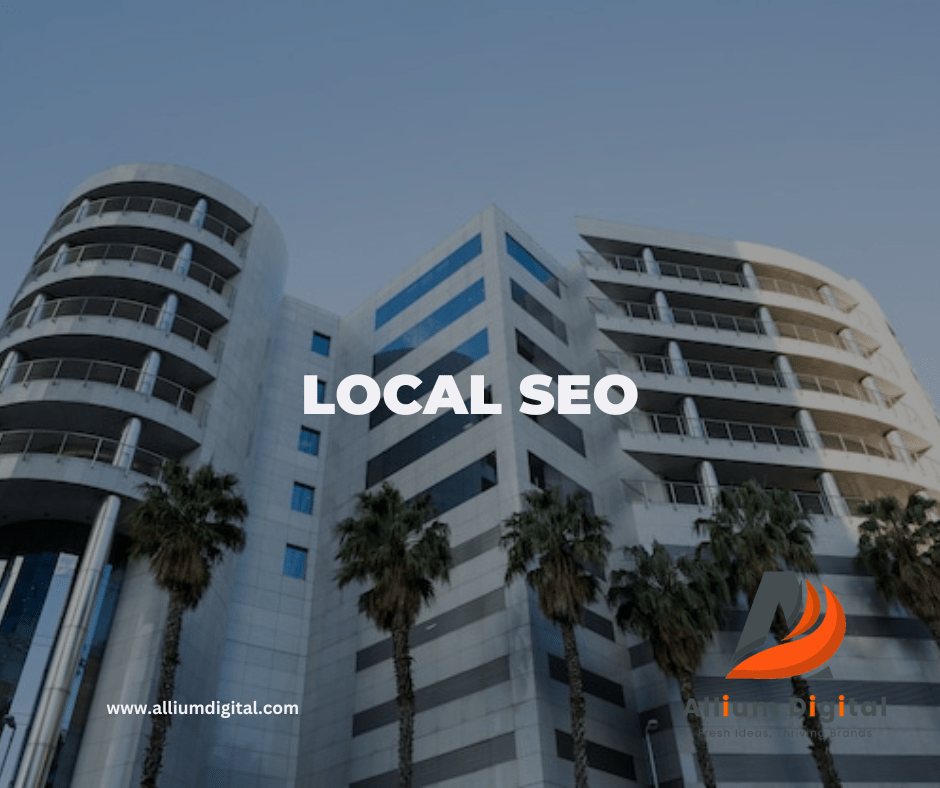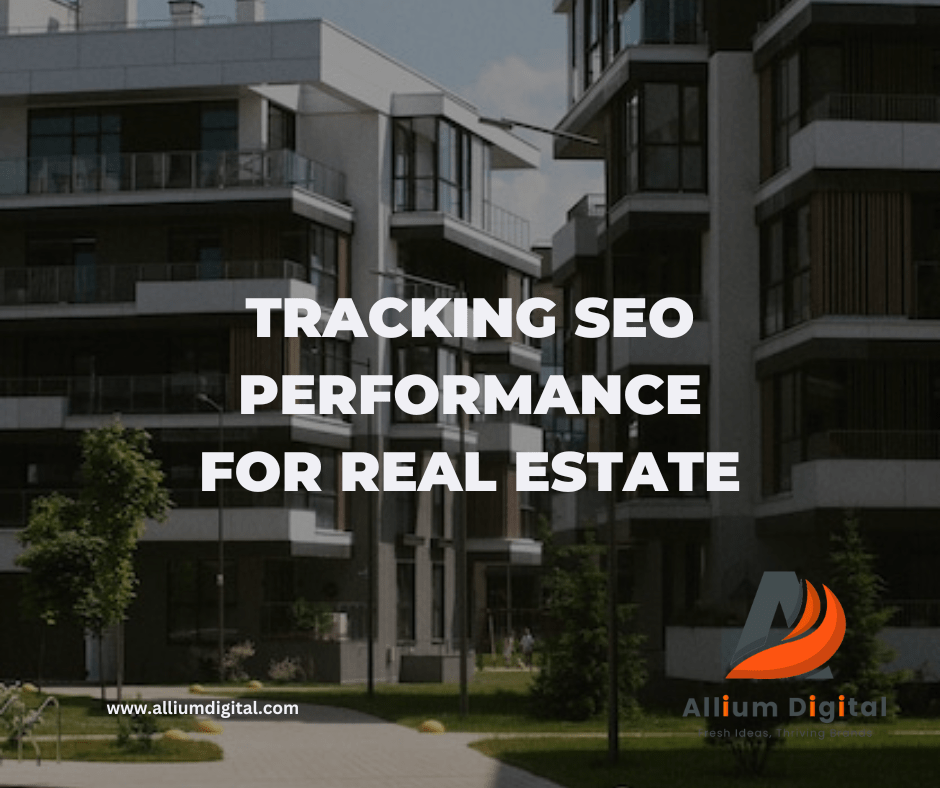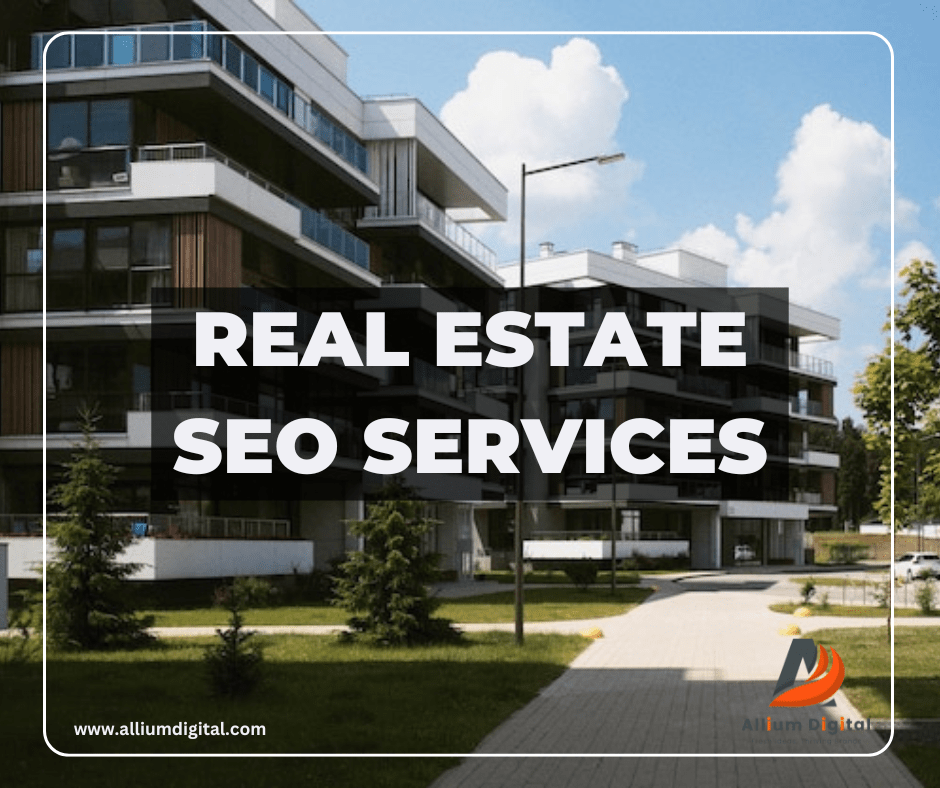If you’re in the real estate game, you already know how crucial it is to stand out online. Homebuyers and renters don’t start their search by walking into your office, they start with Google.
That’s where real estate SEO services come in. If your listings or agency aren’t showing up on page one, you’re missing out on dozens or hundreds of potential leads every month.
In this guide, we’ll explain exactly what real estate SEO involves, why it’s so powerful for agents and brokers, and what services can help you climb the search rankings and stay ahead of your competitors.
- Introduction to Real Estate SEO
- Key SEO Challenges in the Real Estate Industry
- Core Real Estate SEO Services Offered
- Local SEO: A Game Changer for Real Estate Agents
- Real Estate Website Optimization Best Practices
- Content Marketing for Real Estate SEO
- Tracking SEO Performance for Real Estate
- Benefits of Hiring a Real Estate SEO Expert
- Cost of Real Estate SEO Services
- FAQs
- Conclusion
Introduction to Real Estate SEO
What Is Real Estate SEO?
Real Estate SEO (Search Engine Optimization) is improving your website, content, and online presence to rank higher in search engine results for real estate-related queries. It targets buyers and sellers actively looking for property services, listings, and local agents.
It goes beyond adding a few keywords to your site. It’s about making your website search-engine friendly, optimizing for local search terms, speeding up your site, creating helpful content, and building trust signals across the web.
Examples of SEO keywords for real estate include:
- “Homes for sale in [city]”
- “Best real estate agent in Nairobi”
- “Affordable apartments near me”
By ranking for these terms, your website becomes a lead magnet, attracting people when they’re ready to buy, rent, or sell.
Why SEO Matters for Real Estate Businesses
The real estate industry is fiercely competitive, especially online. Buyers want convenience, speed, and trust when browsing listings. Sellers want visibility and results. SEO bridges the gap between your business and your audience.
Here’s why SEO is critical for real estate agents, brokers, and property developers:
- More Visibility: 93% of online experiences start with a search engine. Your competition gets those clicks if you’re not on the first page.
- Targeted Traffic: SEO brings in people actively searching for property-related solutions—not just random visitors.
- Higher ROI: Unlike ads that stop working when you stop paying, SEO is a long-term strategy that builds momentum.
- Brand Authority: Showing up consistently in search builds credibility and trust.
- Local Domination: SEO helps you rank in the areas you serve, even if you don’t have a physical office.
In short, if you’re in real estate and not doing SEO, you’re practically invisible to a huge portion of your market.
Key SEO Challenges in the Real Estate Industry
High Competition in Local Markets
Try Googling “real estate agent in [your city],” and you’ll see pages of agencies, listings, and directories trying to get the top spot. Real estate SEO is tough because you’re competing with other agents and property portals like BuyRentKenya, Jiji, and even Property24.
To beat the competition, you need a smart, locally-targeted SEO strategy that includes keyword optimization, map listings, content marketing, and review management.
Constantly Changing Listings and Content
Unlike static websites, real estate sites are dynamic. Properties are listed and removed constantly. This frequent content change can cause SEO issues like:
- Broken links
- Duplicate content from reposted listings
- Thin content pages (pages with minimal info)
- Indexing issues with Google. We have covered this topic in detail here: What is Crawlability and Indexability in SEO? How to Get Your Pages Seen
You need an SEO-friendly CMS (like WordPress with real estate plugins) and strong technical SEO to handle these shifts without losing rankings.
Mobile and Map Optimization Needs
Most homebuyers and renters browse on their phones. Google says over 60% of real estate searches come from mobile devices. You’ll lose leads if your website isn’t fast, mobile-friendly, and easy to navigate.
Also, map searches (e.g., “real estate agent near me”) are booming. If you’re not optimized for Google Maps and local search, you’re missing out on location-based traffic that converts better than generic search traffic.
Core Real Estate SEO Services Offered
Keyword Research for Real Estate Niches
Real estate is broad, and not all keywords are created equal. Effective SEO begins with precise keyword research targeting terms your ideal clients actually search for.
Here’s how it works:
- Identify buyer intent keywords like “2-bedroom apartments in Nairobi” or “houses for sale in Runda.”
- Focus on local SEO terms, such as “real estate agent in Mombasa” or “plot for sale in Kisumu.”
- Use long-tail keywords like “affordable land for sale near Thika Road” to attract highly specific searchers.
- Consider content-related keywords like “how to buy a house in Kenya” for blog traffic.
Real estate keyword research involves using tools like Google Keyword Planner, SEMrush, and MOZ, plus checking competitor rankings to find content gaps. Good SEO services find these keywords and map them across your entire site for maximum exposure.
On-Page SEO Optimization
Once you’ve got the right keywords, the next step is to place them strategically throughout your website’s content, code, and structure. This process is called on-page SEO.
Key on-page optimization areas include:
- Title tags and meta descriptions that include primary keywords
- Header tags (H1, H2, H3) for content hierarchy
- Alt text on property images
- Clean, keyword-rich URLs (e.g., /apartments-nairobi instead of /page123)
- Internal linking between blog posts, listings, and service pages
- Schema markup for real estate listings (helps Google understand your content better)
A well-optimized site helps users and search engines navigate your content, resulting in better rankings and more leads.
Local SEO and Google Business Profile Setup
Real estate is hyper-local. Buyers want homes in specific neighborhoods. Sellers want local experts. That’s why Local SEO is one of the most powerful tools for real estate professionals.
Services under Local SEO include:
- Creating or optimizing your Google Business Profile (GBP)
- Adding your business to local directories and citation sites
- Embedding a Google Map on your site
- Optimizing for “near me” searches
- Creating localized landing pages (e.g., /real-estate-karen-nairobi)
Claiming and optimizing your GBP ensures you appear in Google’s local pack, which appears above organic search results and includes your location, reviews, and contact info.
Link Building Strategies
Google treats backlinks (links from other websites to yours) as votes of confidence. The more relevant, high-quality links you have, the more trustworthy your site looks in Google’s eyes.
Real estate SEO services typically include:
- Local outreach to newspapers, bloggers, or influencers
- Submissions to property directories and local business listings
- Guest posting on relevant blogs
- Press releases for new developments or real estate news
- Building links through community sponsorships or events
Link building takes time, but it’s one of the most effective ways to build domain authority and outperform your competitors in search rankings.
Technical SEO (Speed, Mobile-Friendliness, Indexing)
Technical SEO ensures your real estate website is beautiful but also fast, crawlable, and error-free. This is especially crucial for sites with dynamic content like property listings.
Common technical SEO services include:
- Mobile optimization and responsive design
- Page speed optimization (compressing images, reducing scripts)
- Fixing crawl errors and broken links
- Submitting an XML sitemap to Google
- Adding structured data for listings (price, location, property type)
Search engines penalize websites that load slowly or have lots of errors. A real estate SEO expert can audit and fix these issues so your site gets indexed and ranked properly.
Local SEO: A Game Changer for Real Estate Agents

Google Maps Ranking and Local Pack Visibility
Have you ever noticed that when you Google something like “real estate agent near me,” the top results are shown on a map? That’s the Google Local Pack, a goldmine for leads. Appearing here means more calls, more visits, and more deals.
To rank in Google Maps, your SEO service provider should:
- Ensure your Google Business Profile is fully optimized
- Encourage happy clients to leave 5-star reviews
- Add NAP citations (Name, Address, Phone) consistently across directories
- Upload quality photos of listings, staff, and your office
- Post regular updates and property announcements
Ranking in Google Maps is often faster than organic SEO and leads to high-converting traffic, especially on mobile.
Managing Reviews and Local Citations
Online reviews can make or break a real estate agent’s reputation. Over 80% of people trust online reviews as much as personal recommendations. A robust SEO strategy includes review management and citation building.
What’s involved:
- Setting up profiles on key sites like Google, Facebook, Jiji, BuyRentKenya, and Property24
- Monitoring and responding to reviews (positive or negative)
- Sending follow-up emails or SMS asking happy clients for feedback
- Fixing inconsistent business info (e.g., wrong phone number or address)
Not only do reviews influence trust, but they also directly affect your local rankings. Google looks at review quantity, quality, and frequency as ranking signals.
Real Estate Website Optimization Best Practices
SEO-Friendly Property Listings
One of the most overlooked aspects of real estate SEO is how property listings are structured and optimized. Many agencies copy and paste content from developers or other sources. This leads to duplicate content issues, which Google penalizes.
Here’s how to make your listings SEO-friendly:
- Unique descriptions for every property
- Include targeted keywords like “3-bedroom apartment in Westlands”
- Use semantic keywords (e.g., “spacious kitchen,” “modern finishes”)
- Add structured data markup so search engines can display pricing, availability, and features directly in search results
- Create internal links to related listings or blog posts
Avoid listing the same property on multiple platforms with identical content. Google values originality, and unique listings give you a better chance of ranking high in search results.
Thinking of launching a real estate website in Kenya? Here is a guide on costing and what to consider: How much does it cost to build a website in Kenya?
Optimizing Images and Virtual Tours
Real estate is visual. A listing without stunning photos or a video walkthrough is a missed opportunity. However, visuals must also be optimized for SEO.
Key image optimization tips:
- Use descriptive file names (e.g., apartment-lavington-nairobi.jpg)
- Add alt text with keywords to help with image SEO and accessibility
- Compress images to reduce file size and boost loading speed
- Use WebP format for better compression without loss of quality
- Create 360° virtual tours or video walkthroughs, and embed them on listing pages
Virtual tours and video content not only engage users longer but also signal to Google that your content is high-quality and user-focused.
Fast Loading Times and Mobile Responsiveness
A slow website is a deal breaker, especially in real estate, where users quickly jump between multiple listings. If your site lags, they’ll bounce.
Here’s how to improve speed and responsiveness:
- Use caching plugins and Content Delivery Networks (CDNs)
- Optimize your hosting, consider upgrading to a VPS or cloud hosting for faster performance
- Ensure your site adapts beautifully to all screen sizes and orientations
- Use AMP (Accelerated Mobile Pages) for property blog content
- Eliminate heavy scripts and unused code
Speed and mobile optimization improve user experience and are official ranking factors in Google’s algorithm.
Content Marketing for Real Estate SEO
Blogging for Local Real Estate Trends
A blog is one of the best ways to drive ongoing traffic to your website. For real estate businesses, it positions you as an expert and allows you to rank for long-tail keywords that attract local searchers.
Content ideas for real estate blogs:
- “Top 5 Neighborhoods to Buy a Home in Nairobi (2025)”
- “What You Need to Know Before Renting in Kilimani”
- “Land Buying Guide for Kenyans: Dos and Don’ts”
- “How to Secure a Mortgage in Kenya”
Each blog post becomes a long-term traffic asset. Plus, you can share these articles on social media and newsletters, multiplying your reach.
Creating Neighborhood Guides and Location Pages
Neighborhood-focused content is gold for SEO. When people search for “houses for sale in Kileleshwa,” Google wants to show hyper-relevant pages to that area. That’s where neighborhood landing pages shine.
What to include:
- Brief history and vibe of the neighborhood
- Average property prices and trends
- Amenities, schools, transportation, and dining options
- Featured listings in the area
- Internal links to blog posts or agents handling that area
These pages help you rank for localized searches, build trust with visitors, and provide real value beyond just listings.
Tracking SEO Performance for Real Estate

Key Metrics to Monitor (Traffic, Rankings, Conversions)
Tracking your SEO efforts is essential. Without analytics, you’re flying blind.
Here are the most important metrics to monitor:
- Organic traffic – Number of visitors from Google
- Bounce rate – Percentage of users who leave without engaging
- Keyword rankings – Where your pages rank for target terms
- Page speed – Load time for mobile and desktop
- Conversion rate – How many visitors fill out contact forms or schedule viewings
- Click-through rate (CTR) – How often your listings get clicked in search results
Use Google Analytics and Google Search Console as your core tools. Add Hotjar or Microsoft Clarity for behavior tracking. Regular reporting helps you refine strategy and prove ROI.
SEO Tools for Real Estate Professionals
There are dozens of tools that make SEO easier. Here are the must-haves:
- Google Analytics & Search Console – Free and powerful
- SEMrush or Ahrefs – Competitor and keyword analysis
- Moz Local – Manage local citations
- Yoast SEO (WordPress) – On-page SEO for content
- Screaming Frog – Website audits and technical checks
- BrightLocal – Local SEO tracking and reporting
- PageSpeed Insights – Speed optimization analysis
Real estate SEO professionals use a mix of these tools to audit, improve, and monitor your site’s performance so you stay ahead in the rankings and close more deals.
Benefits of Hiring a Real Estate SEO Expert
Time Savings and Professional Strategy
Managing your SEO while running a real estate business is like trying to sell houses while building them, possible, but far from efficient. An SEO expert brings experience, strategy, and focus that deliver measurable results without eating into your schedule.
Benefits of hiring a real estate SEO professional:
- Tailored strategy based on your niche and location
- Technical know-how to fix errors you might not even know exist
- Consistent content planning and publishing
- Analytics tracking and reporting to measure ROI
- Avoiding penalties from black-hat SEO mistakes
- Staying ahead of Google algorithm changes
A real estate SEO expert helps you appear in search and dominate it, freeing up your time to close deals and serve clients.
Competitive Edge in Local Markets
Everyone in the Kenyan real estate industry wants to be #1 on Google, but only a few get there. SEO experts know how to beat the competition by analyzing what other agencies are doing and creating a smarter, more effective strategy.
Here’s how:
- Conducting competitive audits to identify ranking opportunities
- Creating hyper-local content that others overlook
- Monitoring keyword gaps to find unclaimed territory
- Building backlinks from reputable local and global sites
- Tracking and adjusting based on competitor changes
Working with a pro ensures you stay one step ahead, always adapting to market trends, algorithm shifts, and local demand.
Cost of Real Estate SEO Services
Pricing Models (Monthly, Per Project, Hourly)
SEO services come in several pricing structures, depending on the scope, goals, and provider’s experience. Understanding these models helps you budget effectively.
Common Pricing Models:
- Monthly Retainer – Ideal for long-term campaigns. Depending on your site size and service depth, the cost ranges from Ksh 25,000 to Ksh 150,000/month.
- Per Project – Best for one-time optimization (e.g., new website SEO setup). Pricing ranges from Ksh 40,000 to Ksh 300,000+, depending on complexity.
- Hourly Rate – Great for audits or consulting. Rates range between Ksh 2,000 and Ksh 8,000/hour.
For most real estate businesses, the monthly retainer model delivers the best value because SEO requires ongoing effort to build momentum and maintain results.
What’s Typically Included in SEO Packages
While every SEO company or freelancer has their offerings, a solid real estate SEO package should include:
- Initial audit (site speed, errors, mobile friendliness)
- Keyword research and strategy
- On-page optimization (meta tags, URLs, content tweaks)
- Local SEO setup (Google Business Profile, local citations)
- Content creation (blogs, neighborhood pages, listing copy)
- Link building (directory listings, outreach)
- Monthly reporting (traffic, rankings, conversions)
- Consulting or strategy calls
Always ask for a clear list of what’s included. Avoid vague packages and insist on regular performance updates.
FAQs
1. How long does it take to see SEO results in real estate?
It typically takes 3–6 months to start seeing noticeable results from SEO, depending on your market, website quality, and competition. SEO is a long-term investment, but the results are more sustainable than paid ads.
2. Is SEO better than paid ads for real estate?
Both have their place. SEO builds long-term traffic and brand authority, while paid ads deliver short-term visibility. Ideally, use both—start with SEO for organic growth and supplement with ads during peak seasons or promotions.
3. Can SEO help me rank in multiple cities?
Yes, with the right strategy. You can create dedicated landing pages for each city or neighborhood you target. These pages should include localized content, listings, and keywords to help you rank in different regions.
4. Do I need a blog on my real estate website?
Absolutely. A blog helps with content marketing, builds SEO authority, and allows you to rank for informational queries like “how to buy land in Kenya.” It’s also a great way to showcase your expertise and drive organic traffic.
5. How much does real estate SEO cost monthly?
Monthly SEO packages in Kenya typically cost between Ksh 25,000 and Ksh 150,000, depending on the scope. The investment pays off in consistent lead generation and long-term online visibility.
Conclusion
Real estate is a competitive industry, and your website can be your strongest lead generator if it’s properly optimized. Real estate SEO services help you attract, engage, and convert buyers and sellers by ensuring your agency or listings rank high on search engines.
From keyword research to technical optimization, local SEO, and content creation, these services go far beyond ranking. They help build authority, drive organic traffic, and grow your business long-term.
Whether you’re a solo agent, brokerage firm, or property developer, investing in SEO is no longer optional. It’s the smartest way to get found by the right people at the right time, and close more deals in the process.

